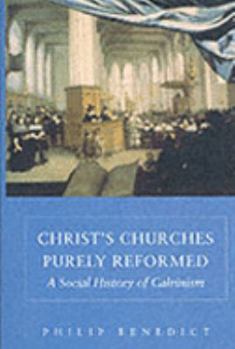Christ's Churches Purely Reformed: A Social History of Calvinism
Select Format
Select Condition 
Book Overview
This sweeping book tells the story of Calvinism's origins, expansion, and impact across Europe from the upheavals of the early Reformation to the end of the seventeenth century. The faith's... This description may be from another edition of this product.
Format:Hardcover
Language:English
ISBN:0300088124
ISBN13:9780300088120
Release Date:November 2002
Publisher:Yale University Press
Length:704 Pages
Weight:2.35 lbs.
Dimensions:1.7" x 6.5" x 9.7"
Customer Reviews
1 rating
The Subtitle is a Bit Misleading.
Published by Thriftbooks.com User , 18 years ago
Thankfully, this book is not social history in the sense that it is concerned with lots of numbers and the lives of non-elites. Instead, Philip Benedict's Christ's Churches Purely Reformed is a magnificent survey of the Reformed movement in Europe during the sixteenth and seventeenth centuries. In this work, Benedict discusses both how the movement shaped Europe and how Europe shaped the Reformed movement. The book focuses not only on the main actors and thinkers of this time, but also shows how Reformed thinking affected the everyday lives of those living in the lands in which it took hold. A reoccurring theme of Christ's Churches Purely Reformed is that Reformed thought is not monolithic. Benedict interestingly asserts that because Reformed thought allowed for a diversity of ecclesiologies, the central ideas disseminated more effectively. This unity among diversity allowed for the various churches in Switzerland, Britain, and France to all claim the same tradition, but have very different manifestations. Notably, the Presbyterian-synod system, which most Reformed churches would later adopt, was developed in France. Thus, from the beginning Reformed theology and ecclesiology was a work in progress. Benedict's discussion of this evolution of the Reformed traditional was helpful because it corrects the myth common among many Reformed denominations that their version of Reformed ecclesiology and manners sprung full-formed from the head of Calvin. However, Benedict notes that even though the differences were often strong, a sense of solidarity and commonality of tradition united the various national churches. "Although the very term Reformed church was infused with ambiguities around 1600, the sense of fellowship and solidarity among these churches was powerful" (291). Most notably, these churches were willing to take communion with one another, the true witness to perceived Christian unity. Benedict's thoughtful critiques of democracy and capitalism's origins in Calvinism were the high points of this book. Without being dogmatic, Benedict calls into question the supposed connections between these ideologies and the theology. Speaking specifically of Weber's thesis, Benedict writes, "His ideas exaggerate the extent to which they characterized the faith as a whole and attribute them too simply to a single cause" (541). Ultimately he concludes that while one can draw superficial and common-sensical parallels, the evidence for placing democracy and capitalism at the feet of Calvinism is very weak. In fact, Benedict notes that many of the characteristics of the Calvinist mind, which would lead to democracy or capitalism, were also present in the minds of Europeans not engaged in Reformed worship. However, Benedict honestly admits that many of his findings regarding the sociological impact of Calvinism "are more tentative and more likely to be revised by future research" than his historical chronology (432). In this work, Benedict atte





